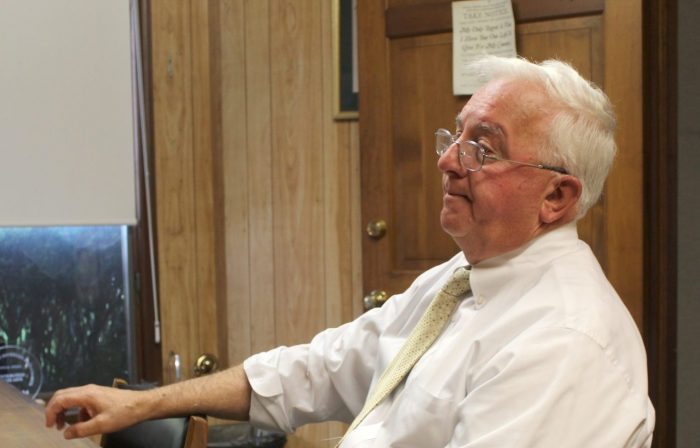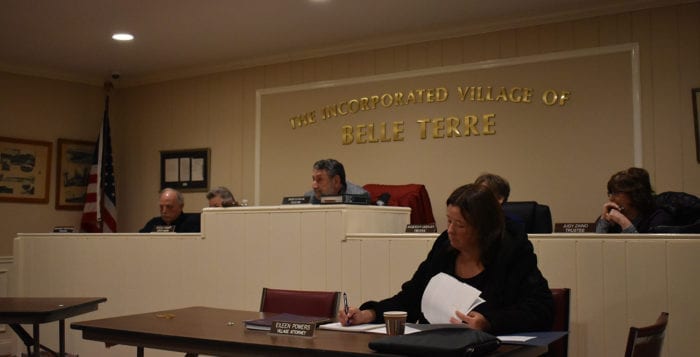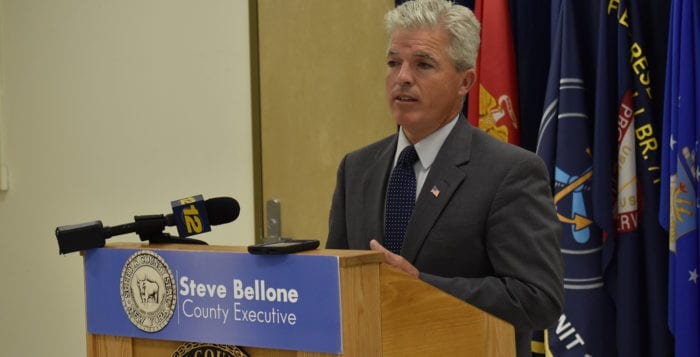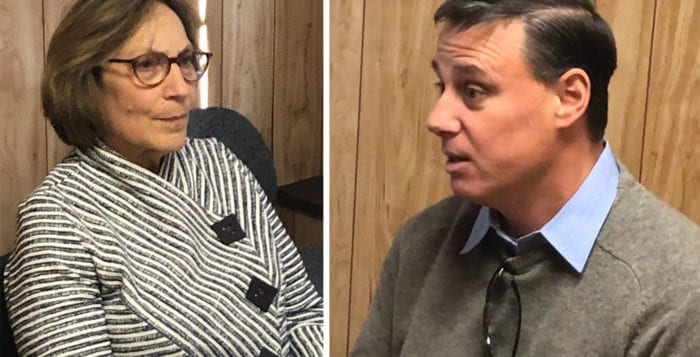After serving in the office for the last eight years, Suffolk County Comptroller John M. Kennedy Jr. (R) is seeking reelection.
His challenger, Democratic Party nominee Thomas Dolan, is not openly campaigning and therefore could not be reached for comment.
‘I think Suffolk County still needs a shakedown.’
— John Kennedy
In an exclusive interview, Kennedy defined the function of the comptroller’s office, its central role in the fiscal stability of the county government, and why he is pursuing election to that office yet again.
He described his responsibilities as overseeing the county’s financial operations. However, the scope of the office goes well beyond this purpose, with auditing powers and administrative duties related to the former Office of Treasurer.
“It has been a great gig,” Kennedy said. “I have thoroughly enjoyed it. Eight years into it, I think we’ve been able to do some good things.” He spoke of his opponent, “I hear he’s a very nice individual.”
Kennedy said he has several programs and policy initiatives he intends to get off the ground if reelected. Among these is upgrading the county’s financial infrastructure to improve the office’s operations and connect currently disconnected frameworks.
“One of the components in that is unifying the capital budget function,” he said. “It is critical from a budgeting perspective, from a management perspective, that we bring all those disparate databases together so that we have continuity and good stewardship of our money.”
Kennedy also plans to request two additional auditors from the county Legislature to oversee the expenditures of approximately $185 million in opioid-related settlements to Suffolk County. [See story, “Suffolk County launches grant application program to fight opioid crisis,” TBR News Media, July 28, also TBR News Media website.]
“Many have said that they want to see contemporaneous oversight of the opioid settlements,” the county comptroller said. “We received $25 million [so far] … but unfortunately, there is a propensity in government for money to go to all different types of things.”
He added, “Our electeds, our advocates, our treatment community want to make sure that there’s good, contemporaneous oversight regarding expenditure and use of those funds.”
Kennedy augmented his audit staff from 19 to 34 members during his two terms in the comptroller’s office. He viewed this as progress and committed to increasing the number of auditors at his disposal.
“I’ve been very aggressive with [hiring] our audit staff,” he said. “I think we need to do more of that. I want to bring that on in some other aspects of the office, including IT.”
Having served in this capacity for some time now, he believes he possesses the requisite experience and institutional knowledge to discharge the county’s finances responsibly.
“This is the kind of office that lends itself to almost limitless opportunities,” he said.
But it has yet to be smooth sailing for Kennedy or the public fund. Citing an analysis, by New York State Comptroller Tom DiNapoli (D), which considered fund balance and borrowing cycles, among other concrete financial measures, he acknowledges that Suffolk County ranks near the bottom among the state’s 62 counties in terms of fiscal responsibility.
“It’s indisputable that going back two or three years ago, we were the 62nd in ranking out of all 62 counties in the state of New York,” Kennedy said. “The most recent evaluation has moved us up.”
Despite Suffolk’s checkered financial record, the comptroller believes this assessment requires further context. He contends the analysis measures Suffolk against other counties throughout the state, which are less populated and with budgets dwarfed by Suffolk County’s $3.8 billion annual budget.
Instead, he favors an “apples to apples” method of comparing the county’s finances to those of the “Big Five”: Suffolk, Nassau, Erie, Monroe and Albany counties.
“They’re the largest concentrations of cities, budget size and municipal function,” he said, adding, “We’re somewhat comparable with them.”
Still, Kennedy supports “serious fiscal reform,” stating that he intends to embark upon a “shakedown” of the county government.
“I think Suffolk County still needs a shakedown,” he said. “The underlying platform and premise for us is unsustainable. Unless we do something to address the proliferation of things that we have — and the areas where we’re not delivering services adequately — I think we will be destined for serious financial strife in ‘24.”
The county government may be able to get through the 2023 fiscal year comfortably, according to Kennedy, due to substantial financial reserves generated during the COVID-19 pandemic. However, he foresees those reserves drying up and the effects to be felt within a year.
“We are on a runaway train with inflation,” he said. “We are seriously, seriously compromised internally in our financial structure.”
Throughout the interview, Kennedy named several individuals with whom he disagreed on policy grounds. In the face of these differences, he finds that he still manages to build bridges across the aisle and discover common ground.
“The middle [of the road], registered, undeclared [voting population] keeps growing,” he explained. “My sense with folks that are in that category is they want to talk about the issues, hear about what’s important to them, and know what you’re going to do with the opportunity they give you.”
Kennedy asserted that the general public is decreasingly tolerant of partisans and political extremists. Instead, the regular voter thirsts for tangible results from the government. The county comptroller says his efforts to reach across the aisle have generally been reciprocal.
“What I’m talking about with them is the operations, the nuts and bolts of government,” he said. “I’m not talking about whether you’re pro-abortion or pro-life, or whether you believe in cashless bail or whether you want to legalize heroine.”
He added, “I’m talking about how to pay bills, how to recruit and keep talent, how to do the things necessary for the vast majority of people that interact with the county government.”
Whether Kennedy will apply his “nuts and bolts” political philosophy to other realms of the county government is still to be decided. Next year, the highest post in Suffolk County, the office of county executive, will be up for grabs.
Kennedy received the Republican nomination for county executive in 2019, but was defeated by incumbent Steve Bellone (D). When asked if he would pursue that office again, Kennedy responded, “We’ll see what the future brings.”

















